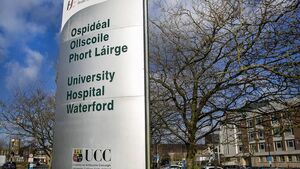Waterford patients left waiting for chemo treatment

Just 65% of patients at University Hospital Waterford received new parenteral systemic therapy within the 15 working day target between January and April 2025.
More people are waiting longer than recommended to start vital cancer treatments in Irish public hospitals.
This is according to a new Journal Investigates study, which revealed that just 65% of patients at University Hospital Waterford received new parenteral systemic therapy within the 15 working day target between January and April 2025.
This marks a significant change when compared to the rate of 75% in 2024 and 73% in 2023.
During the January to April 2025 period, at UH Limerick the percentage of patients who received new parenteral systemic therapy within the 15-working-day target was 82%, Wexford was 97% and South Tipperary was 94%.
A national average of 87% of patients received treatment on time in 2023, according to the investigation.
This dropped to an average of 85% in 2024 and 84% from January to April this year.
The lowest performer during that time was Letterkenny University Hospital, which never met the 90% target.
The HSE recommends that once patients are ready for treatments, like intravenous chemotherapy and immunotherapy, that they should receive them within 15 working days.
A spokesperson for the NCCP told The Journal: “The HSE recognises the critical importance of timely access to cancer treatment and the impact that delays can have on patients and their families.”
They added: “While this target is being met in many instances, it is acknowledged that a number of hospitals continue to experience challenges in consistently achieving this standard.”
“The National Cancer Control Programme are aware,” a spokesperson said to the Journal, “that there are infrastructure deficits in day wards, some of which are addressed by the Capital Plan 2025.”
Meanwhile, the Department of Health told the publication, “Government is fully committed to improving cancer care, ensuring better prevention, maintaining improvements in cancer survival rates, and timely access to treatments.
“Since 2017, funding of €105 million has been invested in the National Cancer Strategy, including €23 million in 2025.”
"It’s getting tougher and tougher,” Dr Michael McCarthy, consultant medical oncologist told The Journal Investigates.
“Waiting to start curative treatment could impact the chances of being able to successfully cure cancer, or control it to maximise the quality of somebody’s life.”
A statement from the Irish Cancer Society said that the new comprehensive data highlights "shocking variation across the country in terms of accessing life-saving chemotherapy and radiotherapy treatment on time. It also spotlights deeply concerning delays for patients who have been referred for urgent breast and prostate tests."
The society outlined key gaps in vital infrastructure and a shortage of various cancer care professionals, including GPs, nurses, radiologists, consultants, and radiation therapists.
Irish Cancer Society CEO Averil Power said: “Early treatment dramatically reduces your risk of dying from cancer. A person’s chances of surviving cancer are up to four times higher when treated at Stage 1 than at Stage 4. That’s why the National Cancer Strategy set target waiting times for cancer tests and treatment. Today’s figures highlight alarming failures to meet those targets in many cancer centres, due to shortages of staff, physical space, and equipment. They also reveal a shocking postcode lottery in Irish cancer care, with where you live determining how quickly you can access lifesaving tests and treatment."
Meanwhile Dr Michael McCarthy, President, Irish Society of Medical Oncology (ISMO) and Consultant Medical Oncologist at University Hospital Galway, said: “Working in the West of Ireland, I see the human cost of the postcode lottery in Irish cancer care every day."
The Irish Cancer Society’s prebudget submission is calling on the Government to address these deficits by prioritising cancer infrastructure in the new National Development Plan and providing at least €20 million in new recurrent development funding for the National Cancer Strategy in Budget 2026.






